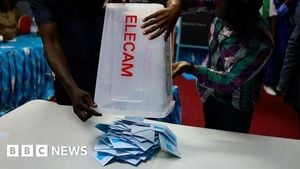In a political upset that has sent shockwaves through Iowa and beyond, Democrat Catelin Drey clinched a decisive victory in the special election for Iowa Senate District 1 on August 26, 2025, breaking the Republican supermajority that had dominated the state Senate since 2022. Drey, a 37-year-old marketing executive from Sioux City, defeated Republican Christopher Prosch by a margin of 55% to 44%, according to unofficial results from the Woodbury County Auditor’s Office and the Iowa Secretary of State. The election was called following the death of Republican Sen. Rocky De Witt, who succumbed to pancreatic cancer in June.
Drey’s win is remarkable not only for its margin—a 10-percentage-point lead in a district that Donald Trump carried by 12 points just a year ago—but also for the broader political implications. As reported by Nexstar Media, this victory marks a 22-point swing from Trump’s 2024 result in the district, signaling what some are calling an “electoral earthquake” in a region long considered safely conservative.
The result immediately alters the balance of power in the Iowa Senate, reducing the Republican advantage to 33-17 and stripping the GOP of its supermajority. This change means that Republicans can no longer approve gubernatorial appointments by Governor Kim Reynolds on a party-line vote, as a two-thirds majority is now out of reach. The supermajority had allowed the GOP to push through nominees and override vetoes without Democratic support, but with Drey’s election, Democratic cooperation is now essential for such actions.
Democratic leaders across the state and nation celebrated the outcome as a sign of shifting political winds. “For the fourth special election in a row, Iowa voted for change,” said Iowa Democratic Party Chair Rita Hart in a statement quoted by San News. “Catelin Drey will listen to the people, not the powerful, get our economy growing, and bring down costs for families.” Hart credited Drey’s win to a massive grassroots effort, noting, “Democrats from all over Iowa came together to give money, knock doors and write postcards.”
This groundswell of support was evident in the campaign’s numbers. As reported by The Downballot, Drey’s campaign fundraising surpassed $160,000 by mid-August, dwarfing Prosch’s $20,000. The Democratic National Committee (DNC) also deployed more than 30,000 volunteers to support Drey’s campaign, while the Republican side spent over $180,000 on the race. Voter turnout, however, remained low, with fewer than one in four registered voters casting ballots.
State Senate Democratic Leader Janice Weiner called Drey’s victory “a win for all Iowans,” telling San News, “Catelin’s agenda of fully funding public schools, affordable childcare and housing, and putting money in the pockets of working Iowans is a clear rejection of the Republican agenda led by Kim Reynolds and the Senate Republicans that have failed Iowans.” Drey herself leaned into this message during the campaign, responding to attacks on her progressive credentials with humor and clarity: “I think I looked great with pink hair, but the upkeep was exhausting. My ‘kooky ideas’ are fully funding our public schools, making housing and child care more affordable, and putting more money back in the pockets of working Iowans.”
The broader context for Drey’s win is a string of Democratic successes in special elections across Iowa and the country in 2025. Earlier in the year, Democrat Mike Zimmer flipped another Iowa Senate seat in January, and Angelina Ramirez won a special election for the Iowa House in April. According to the Democratic Legislative Campaign Committee (DLCC), Democratic candidates have overperformed by more than 10 points on average in special elections this year, including in districts that Trump carried by double digits in 2024.
National Democratic leaders have seized on these results as evidence of a backlash against Republican policies and the so-called “MAGA agenda.” DNC Chair Ken Martin was blunt in his assessment: “Iowans are seeing Republicans for who they are: self-serving liars who will throw their constituents under the bus to rubber stamp Donald Trump’s disastrous agenda—and they’re ready for change.” DLCC President Heather Williams echoed this sentiment, saying, “Democrats’ special election wins should send a flashing warning to the GOP: voters are rejecting the failing MAGA agenda and leaving Republican candidates in the dust.”
Republican leaders, meanwhile, have sought to downplay the significance of the loss. Iowa GOP Chairman Jeff Kaufmann claimed that Democrats were “desperate for a win” and overwhelmed the district with 30,000 volunteers and substantial funding. “If the Democrats think things are suddenly so great again for them in Iowa, they will bring back the caucuses,” Kaufmann wrote on Facebook. Some Republicans attributed their defeat to a “flood of national money,” but others acknowledged that Drey’s ability to connect with voters was decisive.
The implications of Drey’s victory extend beyond the immediate legislative session. With Governor Kim Reynolds announcing she will not seek reelection in 2026, the next gubernatorial race is wide open. The loss of a supermajority means that, should Democrats win the governor’s office, their vetoes would be more difficult for a Republican-controlled legislature to override. As Nexstar Media noted, Democrats see breaking the supermajority as strategically important for future veto protections if they can capture the governor’s mansion.
This string of Democratic victories in Iowa is part of a broader national trend. According to The Downballot, Democrats have flipped two Iowa Senate seats and one in Pennsylvania in 2025, all in districts previously carried by Trump. These results have given Democrats hope that they have momentum with the voters most likely to turn out in the upcoming midterms, even as the party grapples with internal divisions and dissatisfaction following the 2024 presidential election.
Special elections, often characterized by low turnout and unpredictable outcomes, have become a testing ground for both parties ahead of the 2026 midterms. The Democratic National Committee’s aggressive get-out-the-vote and phone-banking campaigns have paid off, with the party winning 37 out of 38 special elections since the 2024 general election, according to internal data cited by San News.
As the dust settles in Iowa, both parties are taking stock. For Democrats, Drey’s victory is a much-needed morale boost and a sign that their message is resonating, even in traditionally conservative areas. For Republicans, it’s a wake-up call that their grip on states like Iowa may be loosening, and that the political landscape ahead of the 2026 midterms could be far more competitive than anticipated.
With Catelin Drey set to serve the rest of De Witt’s term through 2027, the coming years will reveal whether this special election marks a temporary blip or the beginning of a more profound realignment in Iowa politics.





